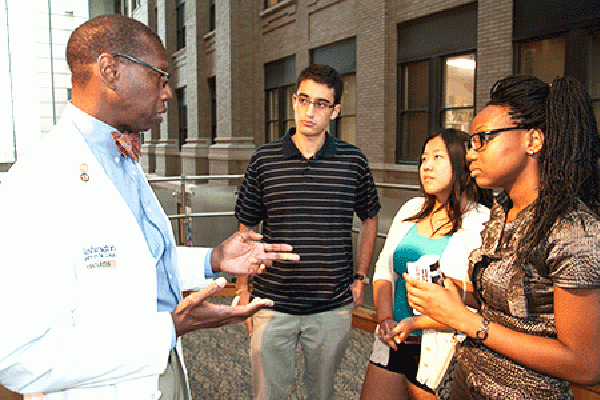Viral infection and specialized lung cells linked to chronic obstructive pulmonary disease
School of Medicine researchers have described another link in the chain of events that connects acute viral infections to the development of chronic obstructive pulmonary disease (COPD). Their discovery points to a new therapeutic target for COPD, an extremely common disease of the lower airways. The image depicts airway epithelial cells from lung tissue of a COPD patient.
Incoming medical students take the plunge
Incoming medical students took part last week in the Washington University Medical Plunge, or WUMP, a weeklong crash course in public health, diversity and health-care disparities. Pictured are students Ally Schelble (left) and Harleen Grewal helping prepare teaching materials for the upcoming school year at Epworth Children & Family Services. WUMP introduces students to myriad opportunities to volunteer.
Society for Developmental Biology meeting Sept. 26-28 on Medical Campus
The Midwest Society for Developmental Biology will hold its 51st annual meeting Sept. 26-28 at Washington University School of Medicine in St. Louis.
Shuttle service expanded to Central West End
A shuttle service that provides rides home to School of
Medicine students and employees has been expanded to include the
Central West End.
Three medical faculty named Wolff professors
Three highly regarded faculty members in the Department of Medicine have been named Alan A. and Edith L. Wolff Professors in their
respective fields. They are (from left) Daniel C. Brennan, MD, Chyi-Song Hsieh, MD,
PhD, and Daniel S. Ory, MD.
DBBS to celebrate 40th anniversary Aug. 21
The School of Medicine’s Division of Biology and Biomedical Sciences (DBBS) will celebrate its 40th anniversary Wednesday, Aug. 21. The division also will honor 10 faculty members who have served on more than 100 DDBS PhD thesis committees.
Tread the Med to begin Thursday, Aug. 8
Tread the Med, the School of Medicine’s popular 100-day wellness program that encourages participants to walk 10,000 steps per day, is set to begin Thursday, Aug. 8, with a kickoff on the Medical Campus.
Freezing sperm taken directly from testicles is effective option for infertile couples
Frozen sperm taken by biopsy from testicles in men with no sperm in their semen is as effective as fresh sperm taken by biopsy in helping couples conceive through in vitro fertilization (IVF), according to a School of Medicine study. Pictured is a section of human testicular tissue and sperm cells viewed through a microscope.
Fuel smoke linked to cardiovascular issues
Burning biomass for cooking and heating, a common practice of rural people in developing countries, has been linked to an increase in cardiovascular problems.
Career development program in OB/GYN moves to Washington University
A research career development program in obstetrics and gynecology is moving to the School of Medicine from University of California-San Francisco. The Reproductive Scientist Development Program
will support the salaries and training of 15 MD or MD/PhD fellows who
want to become physician scientists in obstetrics and gynecology. Pictured is Kelle Moley, MD, recipient of the grant that funds the program.
View More Stories

